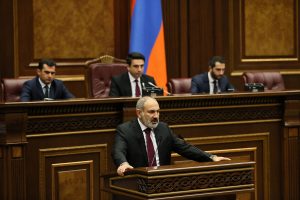
Two years after the latest ceasefire between Armenia and Azerbaijan in their decades long conflict over the Nagorno-Karabakh region, intense clashes suddenly erupted. According to reports, dozens of people have been killed in the renewed shelling. There is no apparent reason for the sudden flareup, but it is indicative of the precarious times we are entering, where people are sensitive, intolerant, uncompromising, and worst of all, combative.
We are facing a long and cold winter. The Russia-Ukraine war is still raging, and there is a severe shortage of gas. Its skyrocketing price is fueling the rising inflation, and staple foods are becoming unaffordable or altogether absent.
Additionally, new viruses or new strains of existing viruses are likely to appear, exacerbating the already heightened tensions. These explosive conditions are bound to ignite conflicts, which could lead to violent clashes like the one in Nagorno-Karabakh, or worse.
To remedy the situation, we must understand, as well as explain to others, that the only way to defuse the situation and reduce the tensions is to vigorously create a positive atmosphere among everyone. We must intentionally cultivate positive connections, since the negative connections are already in place, and the only way to balance them is to establish what is currently missing: positive connections. And if it feels unnatural (and unpleasant) to do so, it is only a proof that the negative connections are already in place and dominate our feelings.
We must remember that we can only make peace with an enemy, and only with an enemy do we need to make peace. It has to feel awkward, since befriending an enemy is the least natural thing to do. The natural thing to do is to fight against one’s enemy. But we have already seen where the natural way leads. I think it is time for us to venture down the unnatural, but surely more constructive and safer way—the way of peace.
We should not expect to agree with one another. The disagreements that have set us against each other will probably remain. Therefore, we should not try to settle our differences. We should, however, agree to disagree, and that from this starting point, we are building a relationship, not a conflict, but a relationship.
This approach will awaken a positive force between us, which will balance the currently prevailing negative force. This will allow us to see new ways of connecting, to find new closeness with people who until now were enemies.
We have tried war, we have tried boycotts, we have tried just about every negative option. It is time we tried to connect without imposing our views and without encroaching, but simply to bond for the sake of bonding.
Photo Caption:
Armenian Prime Minister Nikol Pashinyan addresses parliament following an escalation in hostilities over the Nagorno-Karabakh region along the border of Armenia with Azerbaijan, in Yerevan, Armenia, September 13, 2022. Tigran Mehrabyan/PAN Photo via REUTERS
Posted on KabNet, Medium, Facebook, LinkedIn Newsletter